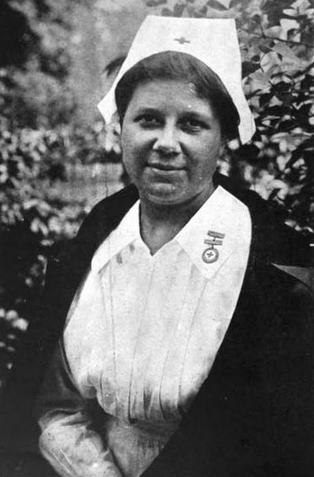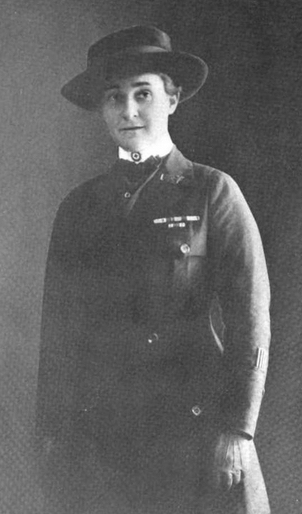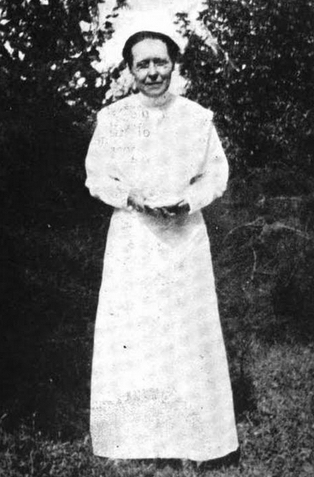
Dame Alicia Frances Jane Lloyd Still, DBE, RRC, SRN (1869–1944) was a British nurse, teacher, hospital matron and leader of her profession. She was one of the leaders in the campaign for state registration of nurses. Following the Nurses Registration Act 1919, she was a member of the General Nursing Council (1920-1937). As chairwoman of the General Nursing Council's first Education and Examinations Committee she helped establish the first national examination standards for the registration of nurses.

Julia Catherine Stimson was an American nurse, credited as one of several persons who brought nursing to the status of a profession.

The Florence Nightingale Medal is an international award presented to those distinguished in nursing and named after British nurse Florence Nightingale. The medal was established in 1912 by the International Committee of the Red Cross (ICRC), following the Eighth International Conference of Red Cross Societies in London in 1907. It is the highest international distinction a nurse can achieve and is awarded to nurses or nursing aides for "exceptional courage and devotion to the wounded, sick or disabled or to civilian victims of a conflict or disaster" or "exemplary services or a creative and pioneering spirit in the areas of public health or nursing education". The Florence Nightingale Medal Commission comprises several members and staff of the ICRC, several of whom are nursing professionals, and the head nurse of the International Federation of Red Cross and Red Crescent Societies. A representative of the International Council of Nurses also participates in the work of the commission.

Florence Aby Blanchfield was a United States Army Colonel and superintendent of the Army Nursing Corps, from 1943 to 1947. She was awarded the Distinguished Service Medal in 1945, and the Florence Nightingale Medal by the International Red Cross in 1951. In 1947 Blanchfield became the first woman to receive a military commission in the regular army.
Florence Sarah Lees was one of the English pioneers of district nursing.

Take Hagiwara (1873-1936) was a Japanese nurse, trained by the Red Cross, and sometimes referred to as the "Japanese Nightingale". She graduated from nursing school in 1897 and after touring Europe and studying hospitals there, was appointed as the first commoner to direct the Japanese Red Cross. In 1920, she led a successful campaign to assist Polish orphans who had become refugees in Siberia and that same year was one of the inaugural recipients of the Florence Nightingale Medal. She served as an honorary delegate to the International Council of Nurses (ICN) for 22 years before she was able to found the Nursing Association of the Japanese Empire in 1929 and gain full admission to the ICN in 1933. She was the Superintendent of Nursing for the Japanese Red Cross for 36 years.

Alma E. Foerster (1885–1967) was an American nurse who worked in both civilian and military care. She began her career as a public health nurse in Chicago and during the First World War helped establish hospitals in Kiev, for which she received the Cross of Saint Anna. She worked in Romania, receiving the Order of the Cross of Queen Marie for her service, before being sent on a humanitarian mission to Archangel, Russia. As one of only two American Red Cross nurses in Archangel, she provided assistance at the military surgical hospital, while the other nurse assisted with civilian nursing. She was one of the inaugural recipients of the Florence Nightingale Medal in 1920. After her return to the United States, she worked in the United States Public Health Service as a nurse, instructor and director of nursing in Chicago, Mobile, Ann Arbor and Racine, before returning to Chicago where she ended her career.

Mary Elizabeth Shellabarger was a Registered Nurse, army nurse overseas during World War I, and director of American Red Cross Nursing Service in Albania and Montenegro.

Anna Hamilton was a French medical doctor, superintendent of the Protestant Hospital in Bordeaux for 34 years, and a proponent of professionalization in nursing.

Alice Louise Florence Fitzgerald ARRC was an American nurse who served in Europe during and after World War I. She earned a Florence Nightingale Medal from the International Committee of the Red Cross in 1927, for her achievements.

Helen Scott Hay was an American Red Cross nurse and nursing educator, working in Kiev and Sofia during World War I. She was awarded the Florence Nightingale Medal by the International Red Cross Society for her contributions.

Melinda Konover Meirs, known as Linda K. Meirs, was an American Red Cross and Army nurse during World War I. She was one of the first six American recipients of the Florence Nightingale Medal, awarded by the International Committee of the Red Cross in 1920.

Florence Merriam Johnson was an American nurse and nursing administrator in World War I, director of the Department of Nursing for the Atlantic Division of the American Red Cross. She was one of the first six American recipients of the Florence Nightingale Medal, awarded by the International Committee of the Red Cross in 1920.

Mary Elizabeth Gladwin was an English-born American Red Cross nurse active in three wars. She was one of the first six American nurses to receive the Florence Nightingale Medal when it was awarded by the International Committee of the Red Cross in 1920.

Lucy Minnigerode was an American nurse in World War I, and founder of the United States Public Health Service Nursing Corps. She was the eighth American recipient of the Florence Nightingale Medal, awarded by the International Committee of the Red Cross in 1925.

Elizabeth Gordon Fox was an American Red Cross nurse, director of the Public Health Nursing Service during and after World War I. She was the twelfth American recipient of the Florence Nightingale Medal when it was awarded by the International Committee of the Red Cross in 1931.

Florence Church Bullard (1880–1967) was an American nurse and recipient of the French Croix de Guerre with a bronze star. Trained at St. Mary's Hospital Nursing School in Rochester, Minnesota, she served with the American Red Cross in the American Volunteer Motor Ambulance Corps.
Mary May Roberts (1877–1959) was an American nurse and long-time editor of the American Journal of Nursing. She was a chief nurse and director at the Army School of Nursing, Camp Sherman, during World War I and was inducted into the American Nurses Association Hall of Fame in 1984.
















